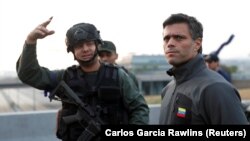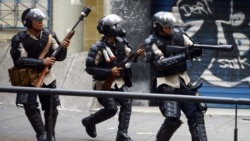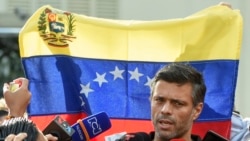At a news conference on February 17, Venezuelan President Nicolas Maduro claimed that his administration has “20 years of evidence against Leopoldo Lopez for all of his crimes, conspiracies and his fascism.”
Except that the purported conspiracies and criminal accusations against Lopez are distortions and falsehoods that rights groups and an academic review have said are politically charged.
Leopoldo Lopez is an important political figure in Venezuela who has consistently challenged Maduro’s authority and that of predecessor Hugo Chavez. Lopez attended Harvard University’s Kennedy School of Government and graduated with a master’s degree in public policy. Four years later, he returned to Venezuela and was elected mayor of Chacao municipality. In 2009, Lopez founded the social-democratic “Voluntad Popular,” or Popular Will party.
After Venezuela tumbled into an ever-worsening economic crisis prior to Chavez’s death in 2013, and extending into Maduro’s presidency, Lopez emerged as one of the country’s leading opposition figures. He was among those who called for peaceful mass protests in 2014 to force Maduro’s resignation. Maduro blamed the protests on “fascist” groups, and Lopez pressed authorities to release protesters jailed in a police crackdown.
"All of these problems — shortages, inflation, insecurity, the lack of opportunities — have a single culprit: the government," Lopez said at the time, as reported by the New York Daily News. Calling the demonstrations "a moral and patriotic duty," he added: "If we don't do it now, then when? And if it's not us, who will?"
For his actions, Lopez was arrested on an array of criminal charges, including murder (which was dropped). Lopez’s defense argued that he did not call for violence or damage to property; on the contrary, the opposition leader had repeatedly called for peaceful demonstrations. His lawyers said the prosecution was politically motivated and that the court denied all their evidence.
In 2015, Lopez was found guilty of public incitement, criminal conspiracy, instigating arson and criminal damage. A judge sentenced him to 13 years and 9 months imprisonment, and he spent three years in the Ramo Verde prison near Caracas before being placed under house arrest.
Lopez was given the maximum sentence after the judge ruled that his anti-government messages via social media and public influence were sufficient evidence of his intent to incite violence.
In response, Lopez sued Venezuela, and his case was reviewed by the Inter-American Commission on Human Rights (IACHR). The commission unanimously backed his side of the case, expressing “profound concern over the complaints it has received regarding the alleged lack of guarantees to ensure due process in the investigations and prosecutions” of Lopez.
Venezuelan officials ignored the commission. But another review of the case, by the Global Freedom of Expression Institute at Columbia University, also sided with Lopez.
“Although there is no evidence that the opposition leader’s speech was an incitement to violence, there is evidence that it was a speech opposing the government that strongly questioned the government leaders and called for social mobilization,” the institute said. "It was, therefore, speech especially protected by international human rights law given its political contents."
While under house arrest, Lopez acted as a mentor to Popular Will politician Juan Guaido, who was elected congressional leader in 2019 and launched a challenge to Maduro’s election victory the prior year. Dozens of countries, including the United States, subsequently recognized Guaido as the country’s interim president. Earlier this year, the European Union withdrew its recognition of Guaido.
In October 2020, Lopez fled to Spain, having spent nearly18 months in refuge at the Spanish ambassador’s residence in Caracas after participating in a failed uprising in April 2019. Lopez is continuing his resistance by encouraging the international community to apply sanctions against top Venezuelan officials, a step the EU announced on Monday.
In a February 22 interview in Spain with Voice of America, Lopez said he sees an opportunity for change in his country under the new U.S. administration of President Joe Biden. “We today have an important job in the short term, and that is to re-group and strengthen pro-democracy forces,” he said.







